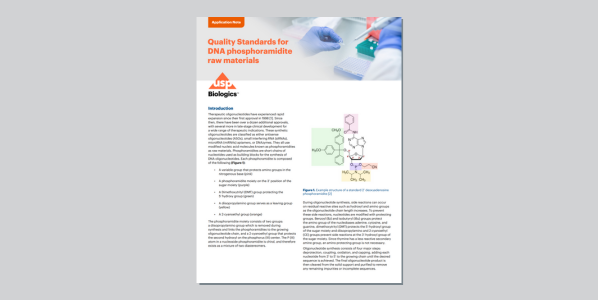Synthetic oligonucleotides are an emerging class of therapeutics that target diseases by mediating RNA functions. Oligonucleotides have already demonstrated great promise in the treatment of neurological disorders, metabolic diseases, cancers, and other diseases. However, due to the rapid growth and advancement of this therapeutic class, there is limited published guidance from regulatory agencies on quality control of oligonucleotide drugs. To bridge the gaps in guidance, USP now offers standards to support quality assessment of critical raw materials used in oligonucleotide synthesis. These standards also aid in navigating the current regulatory landscape concerning the assessment of product-related impurities that may impact safety and efficacy.
Each USP DNA Phosphoramidite Reference Standard is characterized by:
- HPLC analysis, demonstrating isomer retention times and product purity.
- 31P NMR spectroscopy, illustrating compound identification (signals for right-handed (Rp) and left-handed (Sp) diastereoisomers) and purity assignment.
Each USP DNA Phosphoramidite Reference Standard is characterized by:
- HPLC analysis, demonstrating isomer retention times and product purity.
- 31P NMR spectroscopy, illustrating compound identification (signals for right-handed (Rp) and left-handed (Sp) diastereoisomers) and purity assignment.
Each USP DNA Phosphoramidite Reference Standard is characterized by:
- HPLC analysis, demonstrating isomer retention times and product purity.
- 31P NMR spectroscopy, illustrating compound identification (signals for right-handed (Rp) and left-handed (Sp) diastereoisomers) and purity assignment.
Each USP DNA Phosphoramidite Reference Standard is characterized by:
- HPLC analysis, demonstrating isomer retention times and product purity.
- 31P NMR spectroscopy, illustrating compound identification (signals for right-handed (Rp) and left-handed (Sp) diastereoisomers) and purity assignment.
Each USP DNA Phosphoramidite Reference Standard is characterized by:
- HPLC analysis, demonstrating isomer retention times and product purity.
- 31P NMR spectroscopy, illustrating compound identification (signals for right-handed (Rp) and left-handed (Sp) diastereoisomers) and purity assignment.
Products & Resources
Raw Material Testing
Phosphoramidites are modified nucleosides used in the chemical synthesis of oligonucleotides. Synthetic oligonucleotides often contain low levels of multiple classes of impurities which can ultimately influence their efficacy and toxicity.
USP has developed DNA phosphoramidites reference standards that can help manufacturers identify and control impurity profiles during oligonucleotide synthesis using various analytical techniques, including HPLC, 31P NMR, GC, and LC-MS. Ultimately these standards may help yield better control over manufacturing process.
The DNA phosphoramidites reference standards can support the quality assessment of raw materials throughout the life cycle from oligonucleotide products development to lot release.
Click here
Packaging Standards
Click here
Education
- Developing Product-specific Guidances on Oligonucleotides for Generic Drug Development
- USP Standards to Support Quality of Peptide and Oligonucleotide Therapies
- Strategies for the Control of Impurities in Oligonucleotide Synthesis
- Terminal Sterilisation of Oligonucleotide Drug Products
- In-depth Impurity Profiling of Synthetic Oligonucleotides by High Resolution Mass Spectrometry
- CMC and Regulatory Challenges for Oligonucleotide Drugs
- Evaluation of Chromatographic Techniques for Oligonucleotide Separation and Subsequent Detection by HRMS for Routine Testing
- Applications of Green Chemistry in Oligonucleotide Manufacturing
- CMC Regulatory Considerations for Oligonucleotides and Peptides: Similarities and Differences
- Application of NMR Spectroscopy for Characterization and Identity Testing of Oligonucleotide Drug Molecules
- Antisense Oligonucleotide Specification and Release Tests using a Risk-Based Platform Approach
- Method Development for the Characterization of Synthetic Oligonucleotides by LC-MS
- Analytical Method Development for Critical Impurities in Phosphoramidites
- Application Note: DNA Phosphoramidite Reference Standards
Click here


Sign up for updates





